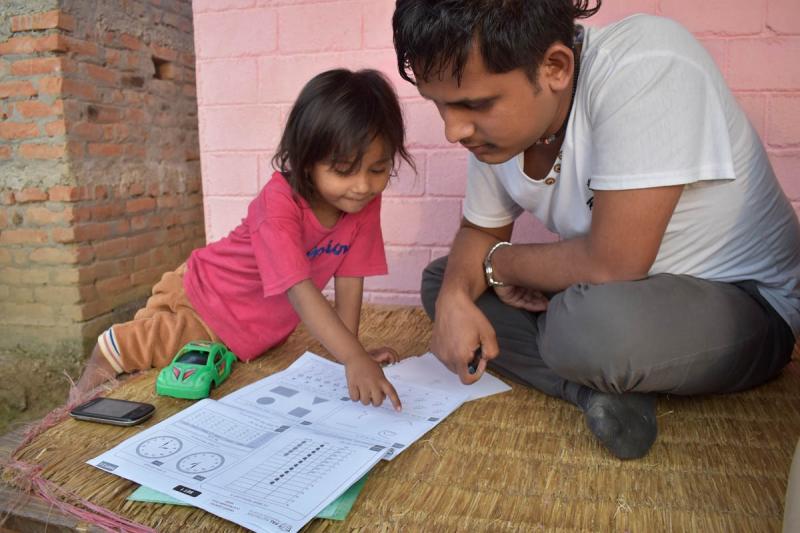
A large body of research affirms that exposure to enabling environments in the early years of a child’s life is critical. This period, globally defined as 0-8 years, is a foundation on which lifelong learning, both in school and life is built.
The importance of understanding learning in the early years
Research in neuroscience provides strong evidence that brain development is most rapid in the earliest years of life. 90% of the brain’s growth has already occurred by the time a child is 6 years old. Research also shows that what children learn in their first few years of life—and how they learn it—can have long-lasting effects on their future. The gaps in foundational learning emerge as early as age 3 to 4, and continue to manifest once children enter school. Understanding the process of learning in the early years enables educators to provide appropriate support and care to young children. This investment yields social and economic benefits, better child wellbeing, more equitable outcomes, poverty reduction and increased inter-generational social mobility. To generate new evidence and insights about learning in the early years, the People’s Action for Learning (PAL) Network is partnering with the Global Partnership for Education Knowledge and Innovation Exchange (GPEKIX) to scale up a common assessment of early and foundational learning across the Global South.
Measuring learning in the early years: siloed solutions so far
The Sustainable Development Goal 4 (SDG 4) framework explicitly addresses learning in the early years. However, there are persistent silos between pre-school years and early primary grades. In many cases there are separate departments, policies, programs and frameworks for children in pre-schools and early primary grades. This can also be evidenced in existing international, regional and national assessments that separately focus either on the pre-school years (MELQO, IDELA, etc.) or primary (and secondary) grades (TIMSS, PiRLS, PASEC, PILNA, etc.).
Using a citizen-led assessment approach for measuring learning in the early years
The Citizen-Led Assessment (CLA) model was conceptualized in India in 2005 with Pratham Education Foundation's Annual Status of Education Report (ASER). CLAs have been conducted at the household level offering a method of assessing learning that is grounded in the realities of the Global South where not all children are enrolled or attend school regularly. Over the past 15 years, this approach has been adapted by several organizations across Africa, Asia and the Americas forming the People’s Action for Learning (PAL) Network, a partnership of member organizations in the Global South.
The following features of the CLA model makes it an ideal approach to develop and implement an assessment of learning in the early years in low resource contexts;
- CLAs reach all children
Low- and middle-income countries have made significant progress in improving access to school, however a significant proportion are still not enrolled in preschool or primary schools. Attendance rates also vary across and within countries and CLAs have been used on a broad age-range of children across diverse contexts. Unlike school-based assessments, CLAs conducted in households ensure representation of all children regardless of their pre-school or school enrollment and attendance status.
- CLAs are child-friendly
Across many low- and middle-income countries, children lack foundational skills even after completing grade 3. A majority of learning assessments are administered in a group setting in a classroom using paper and pencil with the assumption that all children can read. The guided oral and one-on-one assessment approach of the CLAs is particularly suitable for young children who are still learning to read.
- CLAs involve caregivers
Family and community participation in children’s learning is crucial for success. However, parents, caregivers, families, community members and others do not always understand the necessary skill sets and abilities that children need to cope with the demands of learning. To promote this participation, CLAs use engaging tools to involve parents in discussions about their children’s learning.
What lies ahead
Based on the core features of CLAs described above, the PAL Network designed and implemented ICAN (International Common Assessment of Numeracy) in 2019. In its first edition, ICAN reached 1 rural district each in 13 PAL Network countries and assessed more than 20,000 children in the age group of 5 to 16. With support from the Global Partnership for Education Knowledge and Innovation Exchange (KIX), ICAN is now being scaled up to focus on younger children by incorporating experiences from two assessments:
- Annual Status of Education Report (ASER): Early Years assessment by Pratham Education Foundation, which collected data on the schooling or pre-schooling status of children in the age group 4-8 and assessed these children on selected competencies that international research has identified as significant predictors of future success.
- Learning Progression (LP) by Australian Council for Educational Research (ACER), which is a common learning metrics to describe and quantify learning progress in reading and mathematics. The Learning Progression Explorer (LPE) has been developed by ACER as a tool to display and explore learning progressions. The LPE is also intended to support instructional and assessment programs.
The Project Working Group has elaborated the existing ICAN assessment framework and developed additional assessment items targeting learning at the pre-school stage. By the end of 2021, the expanded ICAN assessing learning in the early years will be field piloted in additional districts across 13 countries in Africa, Asia and the Americas by PAL Network member organizations.

